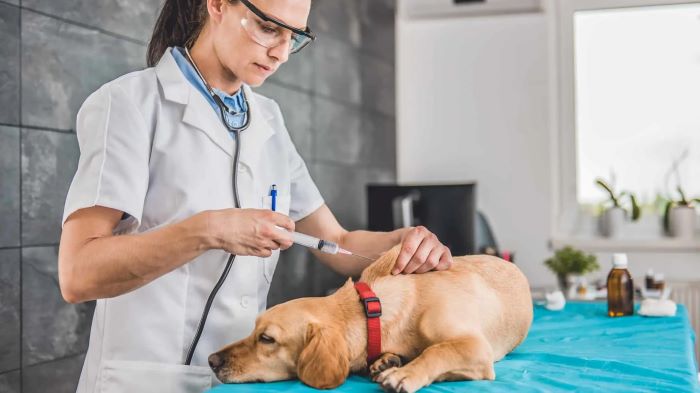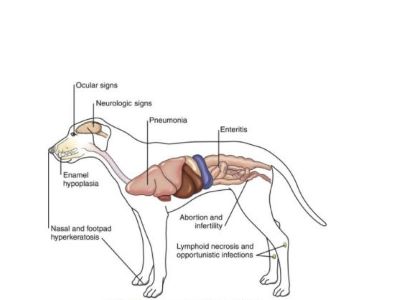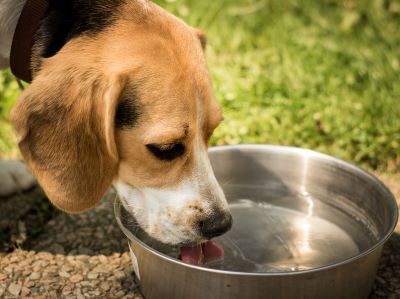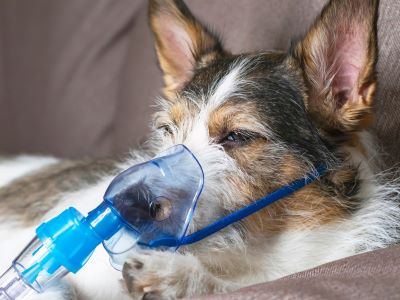You may have heard of the DHLPP vaccine for dogs. But what is it, and does your dog really need it? The DHLPP vaccine is a core vaccine given to both puppies and adult dogs in order to protect them against five different canine diseases.

A combination vaccine, DHLPP is an acronym that stands for distemper, hepatitis, leptospirosis, parainfluenza, and parvovirus. These diseases can be serious and even fatal for dogs, so it is important to know what they are and how to prevent them.
In this blog post, we will explain what each disease is, how it affects your dog, and how the DHLPP vaccine can help keep your dog healthy and happy.
Contents
What is The DHLPP Vaccine for Dogs?
The DHLPP vaccine is a combination vaccine that protects your dog from five different canine diseases. The acronym stands for:
- Distemper
- Hepatitis
- Leptospirosis
- Parvovirus
- Parainfluenza
All dogs in the US must have the DHLPP vaccination since it is regarded as a core vaccine. Puppies and older dogs receive the vaccination in a series of doses, followed by booster vaccinations no more frequently than every three years.
The vaccination can lessen your dog’s chance of contracting certain illnesses, developing them, or passing them on to other dogs or people.
1. What Is Distemper?
Distemper is one of the most serious and deadly diseases that can affect dogs. It is caused by a paramyxovirus that can infect the respiratory, gastrointestinal, and nervous systems of dogs.[1]
The virus can spread through direct contact with infected dogs or their bodily fluids, such as saliva, nasal discharge, urine, or blood.

The symptoms of distemper can vary depending on the stage and severity of the infection. Some common signs include:
- Fever
- Loss of appetite
- Nasal and eye discharge
- Coughing
- Vomiting
- Diarrhea
- Dehydration
- Seizures
- Muscle twitching
- Paralysis
- Death
There is no specific treatment for distemper, only supportive care to manage the symptoms and prevent secondary infections. The prognosis for dogs with distemper is poor, especially if they develop neurological complications. Many dogs die or have to be euthanized due to distemper.
The best way to protect your dog from distemper is to vaccinate them with the DHLPP vaccine. The vaccine can stimulate your dog’s immune system to produce antibodies that can fight off the virus if they are exposed to it.
The vaccine is usually given to puppies at 6 to 8 weeks of age, followed by two or three more doses at 2 to 4 week intervals until they are at least 16 weeks old. Adult dogs need a booster shot every three years or less.
2. What Is Hepatitis?
Hepatitis is another serious disease that can affect dogs. It is caused by an adenovirus that can infect the liver and other organs of dogs. The virus can spread through direct contact with infected dogs or their bodily fluids, such as saliva, urine, or feces.[2]
The symptoms of hepatitis can vary depending on the stage and severity of the infection. Some common signs include:
- Fever
- Loss of appetite
- Lethargy
- Vomiting
- Diarrhea
- Abdominal pain
- Jaundice (yellowing of the skin and eyes)
- Bleeding disorders
- Eye inflammation
- Death

Hepatitis does not have a particular therapy; instead, supportive care is used to treat the symptoms and stop further infections.
The severity of the liver damage and associated consequences affect a dog’s prognosis for hepatitis. While some canines fully recover, others can experience ongoing liver issues or pass away from hepatitis.
The best way to protect your dog from hepatitis is to vaccinate them with the DHLPP vaccine. The vaccine contains an adenovirus-2 antigen that can safely protect your dog from hepatitis without causing side effects.
The vaccine is usually given to puppies at 6 to 8 weeks of age, followed by two or three more doses at 2 to 4 week intervals until they are at least 16 weeks old. Adult dogs need a booster shot every three years or less.
3. What Is Leptospirosis?
Leptospirosis is a bacterial infection that can affect both dogs and humans. It is caused by various strains of leptospira bacteria that can be found in contaminated water or soil.
The bacteria can enter the body through the skin or mucous membranes, especially if there are cuts or wounds. The bacteria can also be transmitted through contact with infected animals or their urine.
The symptoms of leptospirosis can vary depending on the strain of bacteria and the organs affected. Some common signs include:
- Fever
- Loss of appetite
- Lethargy
- Vomiting
- Diarrhea
- Dehydration
- Increased thirst and urination
- Jaundice (yellowing of the skin and eyes)
- Kidney failure
- Liver failure
- Lung hemorrhage
- Death
There is a specific treatment for leptospirosis[3], which involves antibiotics and supportive care to manage the symptoms and prevent organ damage.

The prognosis for dogs with leptospirosis depends on the strain of bacteria, the organs affected, and the timeliness of treatment. Some dogs recover fully, while others may have permanent kidney or liver problems or die from leptospirosis.
The best way to protect your dog from leptospirosis is to vaccinate them with the DHLPP vaccine. The vaccine contains antigens that can protect your dog from four common strains of leptospira bacteria.
The vaccine is usually given to puppies at 11 to 13 weeks of age, followed by another dose at 14 to 16 weeks old. Adult dogs need a booster shot every year.
4. What Is Parvovirus?
Puppies are particularly susceptible to the highly infectious viral infection known as parvovirus[4], which may infect dogs of any age. It is brought on by a parvovirus that can affect a dog’s bone marrow and digestive system.
Direct contact with sick dogs or their excrement can cause the virus to spread.
The symptoms of parvovirus can vary depending on the stage and severity of the infection. Some common signs include:

- Fever
- Loss of appetite
- Lethargy
- Vomiting
- Bloody diarrhea
- Dehydration
- Shock
- Death
Only supportive therapy is available to treat the symptoms of parvovirus and avoid dehydration and subsequent infections. Dogs with parvovirus have a terrible prognosis, especially if immediate treatment is not given. Parvovirus causes many dog deaths or euthanasias.
The best way to protect your dog from parvovirus is to vaccinate them with the DHLPP vaccine. The vaccine can stimulate your dog’s immune system to produce antibodies that can fight off the virus if they are exposed to it.
The vaccine is usually given to puppies at 6 to 8 weeks of age, followed by two or three more doses at 2 to 4 week intervals until they are at least 16 weeks old. Adult dogs need a booster shot every three years or less.
5. What Is Parainfluenza?
Every age of dog is susceptible to the respiratory virus known as parainfluenza, although young or old dogs are more susceptible. It is brought on by a parainfluenza virus, which can affect a dog’s upper respiratory system.
Direct contact with sick dogs or their nasal secretions can cause the virus to spread.

The symptoms of parainfluenza[5] can vary depending on the stage and severity of the infection. Some common signs include:
- Coughing
- Sneezing
- Nasal discharge
- Fever
- Loss of appetite
- Lethargy
There is no specific treatment for parainfluenza, only supportive care to manage the symptoms and prevent secondary infections. The prognosis for dogs with parainfluenza is good, as most dogs recover within a few weeks.
The best way to protect your dog from parainfluenza is to vaccinate them with the DHLPP vaccine. The vaccine contains an antigen that can protect your dog from parainfluenza virus.
The vaccine is usually given to puppies at 6 to 8 weeks of age, followed by two or three more doses at 2 to 4 week intervals until they are at least 16 weeks old. Adult dogs need a booster shot every three years or less.
Benefits and Side Effcets of DHLPP Vaccination in Dogs
The DHLPP vaccine is a combination vaccine that protects dogs from five serious and potentially fatal diseases. It is essential for all dogs in the United States and can help them live longer and healthier lives.
The vaccine can cause some side effects in some dogs, but they are usually mild and short-lived. In rare cases, some dogs may have an allergic reaction that can be life-threatening.
You should always consult with your veterinarian about the best vaccination plan for your dog and report any side effects or concerns you have.
Benefits of DHLPP Vaccination in Dogs
- Protects dogs from five serious and potentially fatal diseases: distemper, hepatitis, leptospirosis, parvovirus and parainfluenza.
- Prevents dogs from getting sick or dying from these diseases and reduces the risk of spreading them to others.
- Considered a core vaccine for all dogs in the United States.
- Helps dogs live longer and healthier lives.
Side Effects of DHLPP Vaccination in Dogs
- Most side effects are mild and short-lived, such as pain, swelling, fever, lethargy, loss of appetite, vomiting or diarrhea.
- Rarely, some dogs may have an allergic reaction that can cause hives, itching, swelling, difficulty breathing or collapse.

- Allergic reactions are medical emergencies and require immediate veterinary attention.
- The risk of an allergic reaction is higher in dogs with a history of vaccine reactions or allergies.
- The benefits of the DHLPP vaccine outweigh the risks for most dogs.
FAQs
How often does my dog need DHLPP vaccine?
Your dog needs the DHLPP vaccine in a series of shots as a puppy and then every three years or less as an adult. The exact schedule may vary depending on your veterinarian and your dog’s health.
Does my dog need DHLPP vaccine?
Yes, your dog needs the DHLPP vaccine to protect them from five serious and potentially fatal diseases: distemper, hepatitis, leptospirosis, parvovirus and parainfluenza. The DHLPP vaccine is a core vaccine for all dogs in the United States.
What is the difference between DHLPP and DHPP vaccine?
The difference between DHLPP and DHPP vaccine is that, Leptospirosis vaccination is part of the DHLPP vaccine but is not part of the DHPP vaccine.
How much does the DHLPP vaccine cost?
Generally, the full set of DHLPP vaccine shots can range from $12 to $25 per shot, with the full series costing about $150. This does not include the office visit fee, which can be another $40 to $75. Some veterinarians may offer discounts or packages for multiple vaccines.
Conclusion
The DHLPP vaccine is a combination vaccine administered to dogs to protect them against several diseases. It is considered a core vaccine, recommended for all dogs due to the prevalence and severity of the targeted diseases.
The vaccine helps to protect dogs from severe illness, organ damage, and even death. It is a combination, core vaccine that offers immunity against Distemper, Hepatitis, Leptospirosis, Parvovirus, and Parainfluenza.
By knowing and understanding “What Is the DHLPP Vaccine for Dogs?” and also what are the benefits and side effects of DHLPP vaccination, you can start giving your canine DHLPP shots if you’re not giving them yet, but you should always consult your vet before every vaccination shot.
We hope this blog post give you the better understanding about the DHLPP vaccine for dogs. Thank you for reading!
References:
- Distemper in Dogs and Wildlife. (n.d.). Retrieved June 8, 2023, from http://publichealth.lacounty.gov/vet/distemper.htm- PublicHealth
- Sykes, J. E. (2014). Infectious Canine Hepatitis. In Elsevier eBooks (pp. 182–186). https://doi.org/10.1016/b978-1-4377-0795-3.00018-1- NCBI
- Klaasen, H. L. B. M., & Adler, B. (2015). Recent advances in canine leptospirosis: focus on vaccine development. Veterinary Medicine : Research and Reports, 245. https://doi.org/10.2147/vmrr.s59521- NCBI
- Nandi, S., & Sharma, M. (2010). Canine Parvovirus: Current Perspective. Indian Journal of Virology, 21(1), 31–44. https://doi.org/10.1007/s13337-010-0007-y- NCBI
- Cordisco, M., Lucente, M. S., Sposato, A., Cardone, R., Pellegrini, F., Franchini, D., Di Bello, A. V. F., & Ciccarelli, S. (2022). Canine Parainfluenza Virus Infection in a Dog with Acute Respiratory Disease. Veterinary Sciences, 9(7), 346. https://doi.org/10.3390/vetsci9070346- NCBI

Dania is a dog groomer living in California, who loves styling dogs. She often uses dog accessories to keep them distracted while grooming. She is also a dog parent to a Pomeranian, Duke. It’s because of him she is always on a lookout for the best dog foods, toys, other dog accessories, and ways to keep him equipped, healthy and happy.


